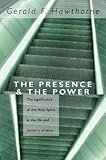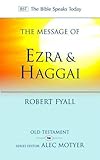

The Series
Since this is the first commentary in the brand new Zondervan Exegetical Commentary series, slated to cover the entire New Testament, let me take a moment to describe the series. It is bound in hardback, with the slightly squarer pages that Zondervan seem to be preferring these days.
The way the commentary is structured is reminiscent of the NIV Application Commentary, except for this one has more sections.
Literary Context deals with issues of structure, and the flow of argument throughout the book. Then Main Idea is a single paragraph summary of the main point of the passage under study. Then follows Translation which is actually presented in a chart form analysing the sentence structures. The translation itself is actually a bit cumbersome to read, as it is fairly literal in style. Next follows a section on Structure which essentially describes the findings of the chart. Following that we have Exegetical Outline which again reviews the structure, but rephrased as whole sentences (a bit like the main points from a sermon). In many ways, this was the most helpful section of the structure analysis.
As can be seen, with five sections devoted to structure and literary context, this is a strong focus of the Zondervan Exegetical Commentary series. Whilst it claims to be targeted at preachers, I couldn’t help wondering whether at least part of the goal was for them to become standard seminary textbooks for those studying their way through a book.
Having covered the structure and outline, the Explanation of Text is the main meat of the commentary. Each verse is presented in English first then Greek. What follows is primarily exegesis, although occasionally it strays into application. Greek words are often used, although always translated on their first use. There are plenty of quotes and insights from other commentators (especially Moo, Davids, Laws and Martin). There is also a generous amount of footnotes, again often interacting with other commentators.
Finally, Theology in Application attempts to apply the teaching of the passage to modern day life. Often this section takes the opportunity to briefly survey other passages of the Bible that teach on the same theme. The comments sometimes reference current events or movies, and deal with potential with misunderstandings or inappropriate applications of the text. Even this section is worded in a fairly academic way, so despite superficial similarities, the feel is very different to the NIV application commentary series.
Finally, in various places there are In Depth sections which are essentially excursuses taking on a particularly difficult exegetical issue.
The Introduction
Apparently long introductions are not intended to be a feature of the ZEC series, so this one covers the usual points in reasonably succinct style. For structure they state that James consists of about a dozen passages of preachable length, and go broadly with David’s approach, identifying three key themes of trials, wisdom, and riches & poverty. They argue that “the letter is heavily indebted to the Jesus tradition and is therefore fully Christian”.
"Faith in action, especially social action, remains central for this author … James sees no tension between orthodoxy and orthopraxy.”
Interestingly, an analysis of the theology of James is left out of the introduction in favour of a section at the end of the book, which highlights several key themes before selecting single-mindedness as the unifying theme of the book.
The Commentary
This particular commentary is co-authored by Craig Blomberg along with his research assistant Mariam Kammell. It would seem from the preface that Kammell was primarily responsible for drafting the “explanation of text” sections, with Blomberg doing the rest, although they make it clear that the whole volume is a joint effort.
I was reading this at the same time as reading Douglas Moo’s superb commentary on James in the Pillar series, so the question I had in my mind was, what added value did this volume give? Perhaps the main strength for me was the fruits of Blomberg’s prior work for Neither Poverty Nor Riches shining through. This commentary seems to pack more of a punch when dealing with the issues of money and poverty. It was brilliant on Jas 1:27 discussing care for the helpless.
James asks, in essence, “Did you in fact realize that the meeting of needs is not peripheral, nor optional, but central and obligatory to your faith?”
There are some helpful quotes in the section that works through the relationship between faith and works.
“Works” here are not the Pauline “works of the law” such as circumcision, but rather the works of love, such as caring for those who are in need, not showing favouritism, being humble, or being slow to speak.
Where Paul denies the need for pre-conversion works, James emphasizes the absolute necessity of post-conversion works.
One of the “in depth” sections deals with the question of whether the “teachers” in mind in James 3 were only men. They argue that 1 Tim 2:12 restricts the office of elder to men, but does not restrict women from teaching.
As I mentioned, the commentary on areas of the letter touching on wealth and poverty tends to be the most incisive and challenging. For example, on James 5:1-6 they comment:
How many upper- or middle-class Western Christians have so many extra, largely unused clothes, so that, were it not for mothballs or their equivalent, they would have become moth-eaten. How many have other needless possessions, even investments, that are not being used for much of anything…
How many churches think that the only realistic option when they outgrow one facility is to build a bigger, more upscale one, with perhaps millions of dollars diverted from truly helping the world’s destitute, physically and spiritually?
The explanation of the text is thorough but not exhaustive. For example, on Jas 5:16 I was hoping to read something on the meaning of δικαιου (righteous) but it was not touched on.
The theology in application section is a welcome addition, but should not be looked to as a source of a quick sermon outline. I appreciated the attempts to prophetically challenge the evangelical church, and their willingness to make potentially controversial statements, such as criticising church building projects, or a number of statements on the church’s attitude to gays and lesbians:
Many conservative Christians vote against equal rights for gays and lesbians without any balancing, positive actions to show them Christ’s love, making the legislation merely judgmental rather than fully scriptural.
The generous number of genuinely helpful footnotes is also a big strength of this volume (and hopefully the whole series). I found they were regularly worth consulting, unlike the more academic footnotes found in many other commentaries.
I would also say it is a series that I will watch with some interest, even though it is fighting for space in an already very crowded New Testament commentary market. The format seems well suited for working through an epistle. I will be interested to see how well it works for the gospels, with Grant Osbourne’s Matthew due to be published soon.






